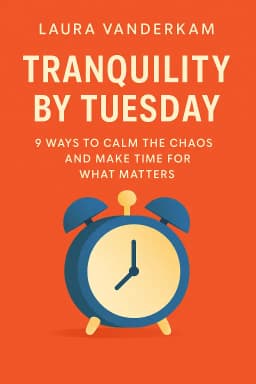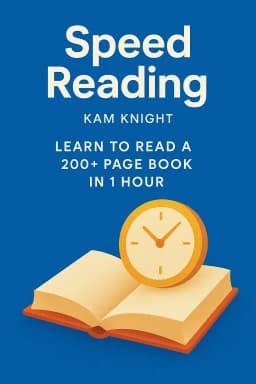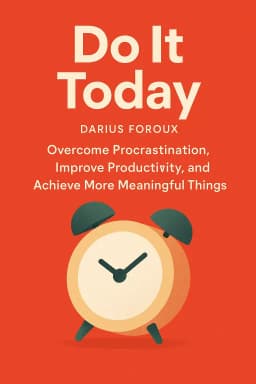
The Willpower Battery
A Short Guide to Making Over Your Mornings—and Life
Golden Hook & Introduction
SECTION
Mark: A psychology professor walks into a lab with a plate of fresh-baked cookies and a bowl of radishes. What happens next doesn't just explain why you skip the gym after work—it might hold the key to redesigning your entire life. And it all happens before breakfast. Michelle: Okay, that is a heck of a setup. Cookies, radishes, and life-altering secrets? I'm in. This sounds less like a science experiment and more like a weird philosophical riddle. Mark: It’s a bit of both, actually. That experiment is at the heart of a fascinating little book, What the Most Successful People Do Before Breakfast by Laura Vanderkam. Michelle: Ah, Vanderkam. She's a big name in the time management world. Isn't she the one who lives this stuff, with like, five kids and a huge career? She's not just talking theory. Mark: Exactly. She’s a journalist and author who has built her career on studying how people use their time, and this book is her powerful manifesto on mornings. While it's gotten some mixed reviews for being so short, it's packed with a central, game-changing idea. Michelle: And I'm guessing it has something to do with choosing the radish over the cookie? Mark: You are absolutely right. It argues that how we handle that simple choice—the tempting versus the disciplined—first thing in the morning dictates our success for the rest of the day.
The Willpower Battery: Why Mornings Are Your Secret Weapon
SECTION
Mark: So let's go back to that lab. The experiment was run by a psychologist named Roy Baumeister. He brought in a group of hungry students who had been asked to fast. He puts them in a room with those freshly baked chocolate chip cookies and a bowl of radishes. Michelle: Oh, that's just cruel. The smell of cookies when you're starving? That’s psychological warfare. Mark: It was! And here's the twist. He told one group they could eat the cookies. He told the other group they could only eat the radishes, but they had to sit there smelling the cookies. Michelle: The radish group. My heart goes out to them. I can feel their pain. So they sat there, munching on bitter radishes while the aroma of chocolatey goodness filled the air. What happened? Mark: They resisted. They ate the radishes as instructed. But here’s the real experiment. Afterwards, Baumeister gave both groups a second, seemingly unrelated task: a set of geometry puzzles that were, secretly, impossible to solve. He wanted to see how long they would persist before giving up. Michelle: And let me guess, the cookie-eaters, high on sugar and victory, worked on it for ages? Mark: The cookie-eaters and a control group that got no food at all both lasted for about 20 minutes on average. But the radish-eaters? They gave up in just 8 minutes. Michelle: Whoa, hold on. Just the act of resisting the cookie made them quit the puzzle almost three times faster? That's wild. It’s like their brains were just… tired. Mark: Exactly. That’s the core discovery. Baumeister concluded that willpower isn't a character trait. It's a finite resource, like a muscle that gets fatigued with use. The radish-eaters had exhausted their self-control muscle on saying "no" to the cookies, so they had less of it left for the frustrating puzzle. Michelle: That makes so much sense. So my willpower is like my phone battery? It starts at 100% when I wake up, and every decision I make—resisting the snooze button, choosing a healthy breakfast, not snapping at a coworker—drains it a little bit. Mark: That's the perfect analogy. And by the end of the day, when your battery is at 15%, you're far more likely to skip the gym, order takeout instead of cooking, and binge-watch a show instead of reading a book. You haven't become lazy; your self-control is just depleted. Michelle: Okay, but isn't 'willpower' sometimes just an excuse? I mean, some people just seem naturally more disciplined than others. Mark: Vanderkam addresses this idea. It’s true that, like a muscle, it can be strengthened over time with practice. But on any given day, it is still a limited resource for everyone. The most disciplined people aren't necessarily superheroes with infinite willpower; they are just better strategists. They understand their battery is fullest in the morning, so they tackle the hard, important things first, before the day has a chance to drain them. Michelle: So checking my email and social media first thing in the morning is like using 50% of my battery on a silly game before I've even left the house. Mark: Precisely. It’s a low-value activity that consumes your highest-value resource. You're giving your peak mental energy to other people's agendas, not your own.
The 'Pay Yourself First' Principle for Your Life: What to Actually Do Before Breakfast
SECTION
Michelle: Okay, so my morning brain is a superhero with a fully charged battery. But what's the mission? What am I supposed to do with all this power? Just... not eat cookies and avoid Instagram? Mark: This is where Vanderkam gets really practical. She says the mission is to apply the financial principle of "pay yourself first" to your life. Before you pay your bills or spend on anything else, you put money into savings. She argues you should do the same with your time and willpower. Before you give it to your boss, to emails, to the chaos of the day, you should invest it in the things that create long-term value. Michelle: And what are those things? Mark: She breaks them down into three categories, a kind of life-portfolio. One: Nurturing Your Career. This isn't about answering emails; it's about deep, focused work on a major project, strategic planning, or learning a new skill. Two: Nurturing Your Relationships. This means being present for your family, having a real conversation over breakfast, or connecting with a partner. Three: Nurturing Yourself. This is the classic stuff: exercise, meditation, journaling, or working on a creative project. Michelle: These are all the things that we say we'll do "when we have time," which of course means we never do them. Mark: Exactly. They are "important, but not urgent." No one is going to fire you today if you don't go for a run or brainstorm your five-year plan. So those tasks get pushed aside by the "urgent," like a ringing phone or a new email. By tackling them first, you guarantee they happen. Michelle: That sounds great in theory. But can you give me an example of someone who actually does this? Mark: A great one from the book is Steve Reinemund, the former CEO of PepsiCo. This is a guy running a massive global company. His routine was to wake up at 5:00 AM, run four miles on the treadmill, then spend time in prayer and reading. Only after that would he have breakfast with his teenage kids before heading to the office. Michelle: Wow. So he took care of his physical, spiritual, and family needs all before his workday even began. Mark: Yes. He said he cherished that time because it was his. It centered him. It wasn't something he tried to cram in at the end of a grueling day; it was the foundation he built his day on. Michelle: I have to say, though, that's great for a CEO who probably has a lot of support. But what about a regular person with a long commute and kids to get to school? Vanderkam's advice gets criticized for being a bit out of touch for some, doesn't it? It feels like a privilege to have a quiet, contemplative morning. Mark: That is the most common and a very fair criticism. And Vanderkam acknowledges that not everyone can or should wake up at 5 AM. The core idea isn't the specific time, but the intentionality. This is where her five-step plan comes in, and it's all about starting realistically. Michelle: Okay, what's the plan? Give me the practical steps. Mark: It's simple. Step one: Track your time. For a week, just see where your time actually goes. You'll be surprised. Step two: Picture the perfect morning. What would you love to do? Not what you should do. Maybe it's 15 minutes of reading, not an hour-long workout. Step three: Think through the logistics. What needs to happen to make that possible? Maybe it's packing lunches the night before. Michelle: I like the example she gives about the "Good Mother Lunch Dilemma"—the idea that you have to make your kids' lunches in the morning. She challenges you to ask, is that really a rule? Or is it a choice? Maybe they can buy lunch, or learn to make it themselves. Mark: Exactly! It's about questioning your assumptions. The final two steps are: Build the habit—start incredibly small, maybe with just five minutes—and Tune up as necessary. Life changes. A routine that worked before you had kids won't work after. The goal is to be flexible, not rigid.
Synthesis & Takeaways
SECTION
Mark: So when you pull it all together, the book's message isn't really about becoming a "morning person" in the way we typically think of it. It’s about a profound shift in perspective. Michelle: It's moving from being reactive to being proactive. Instead of waking up and letting the world dictate your day with pings and notifications, you're seizing the first hour to dictate your own life's direction. Mark: That's it perfectly. The deep insight is that your willpower is this precious, non-renewable daily resource. You can either let the day's chaos drain it randomly on trivial things, or you can consciously choose to invest it first thing in the activities that actually compound over time to build a better career, stronger relationships, and a healthier self. Michelle: I love that. It feels less like a command—"You must wake up early!"—and more like a powerful, personal strategy. It’s empowering. Mark: It is. And it creates what happiness researcher Shawn Achor calls a "cascade of success." When you start the day with a victory, even a small one like a 10-minute walk or writing one page in a journal, your brain records a win. That makes you more likely to take the next positive step, and the next. Michelle: So the one concrete thing a listener could do today isn't necessarily to set a new, terrifyingly early alarm. It could just be to follow Vanderkam's first step: track your time for one evening. Don't judge it, just observe. See where the energy and time are really going. Mark: Exactly. And then ask yourself: what could I do with just 15 of those minutes back in the morning? What small win could I give myself? We'd genuinely love to hear what you discover. Share your 'one morning thing' with the Aibrary community on our socials. It’s amazing to see what people come up with. Michelle: This is Aibrary, signing off.









